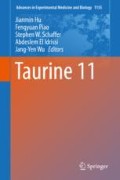Abstract
This study was conducted to investigate the effects on the cognitive function of the elderly with dementia, after consumption of menus developed to prevent dementia. For the purpose of this study, we developed two menus incorporating lotus seeds and taurine which are known to be effective in preventing dementia: tea supplemented with taurine and lotus seed (TATL) and scorched glutinous rice water supplemented with taurine and lotus seed (SATL). The most optimized supplement was determined through sensory evaluation, and was served with the normal diet for 4 weeks. The subjects of this study were 46 elderly women with dementia, divided into three groups: 16 subjects in the taurine supplement group (TG), 15 subjects in the taurine and lotus seeds supplement group (TLG), and 15 subjects in the control group (CG). Cognitive function was assessed by comparing the scores of MMSE-DS (Mini-Mental State Examination-Dementia Screening) before and after dietary supplementation, with higher scores indicating better cognitive functions. Statistical analysis was performed using SPSS 20.0 for Windows. The total score of MMSE-DS before supplementation SATL was not significantly different between CG (14.1 points), TG (14.2 points), and TLG (13.8 points). However, after consuming the SATL supplement, the total score of TG (16.7 points) and TLG (16.9 points) significantly increased (p < 0.01). In particular, in the case of TG, a significant increase was observed in the score for ‘Judgment and abstract thinking’ (p < 0.05). An increased tendency was also observed for scores of ‘Place orientation’ (p = 0.071) and ‘Ability to execute’ (p = 0.054), although statistically not significant. In the case of TLG, score of ‘Place orientation’ and ‘Judgment and abstract thinking’ was significantly increased (p < 0.05). These results show that dietary taurine supplementation has positive effects on the cognitive function (MMSE-DS) of elderly women with dementia. There-fore, it is necessary to include dietary taurine supplementation for the treatment and prevention of dementia. In addition, it is necessary to develop and supply a variety of menus containing taurine.
Access this chapter
Tax calculation will be finalised at checkout
Purchases are for personal use only
Abbreviations
- TATL:
-
Tea supplemented with Taurine and Lotus Seed
- SATL:
-
Scorched Glutinous Rice Water supplemented with Taurine and Lotus seed
- TG:
-
Taurine Supplement Group
- TLG:
-
Taurine and Lotus Seed Supplement Group
- CG:
-
Control Group
- BMI:
-
Body Mass Index
- MMSE-DS:
-
Mini-Mental State Examination-Dementia Screening
- EEG:
-
Electroen-cephalography
References
Cha HS, Oh JY, Park TS (1999) Effects of oral taurine supplementation on plasma concentration and urinary excretion of free amino acids in healthy female adults. Korean Nutr Soc 32(2):158–165
Christina F, Asa S, Annika W, Licentiate MS, Ann-Christine TB, Faxen-Irving G, The OmegAD Study Group (2010) To be a good food provider: an exploratory study among spouses of persons with Alzheimer’s disease. Am J Alzheimers Dis Other Dement 25(6):521–526
Clare L, Woods RT, Moniz Cook ED, Orrell M, Spector A (2006) Cognitive rehabilitation and cognitive training for early-stage Alzheimer’s disease and vascular dementia (Review). Cochrane Collab Issue 3
Imana P, Purnuma D (2015) A review on Lotus (Nelumbo nucifera) seed. Int J Sci Res (IJSR) 4(7):1659–1666
Kim JS, Kim JY (2016) Improving the legal basis for elderly-friendly foods. Health Welfare Policy Forum 5:80–89
Kim CG, Kim HT, Lee SH (2013) Clinical implications of EEG and ERP as biological markers for Alzheimer’s disease and mild cognitive impairment. Korean J Biol Psychiatry 20:119–128
Kim HY, Kim HV, Yoon JH, Kang BR, Cho SM, Lee SJ, Kim JY, Kim JW, Cho YD, Woo JW, Kim YS (2014) Taurine in drinking water recovers learning and memory in the adult APP/PS1 mouse model of Alzheimer’s disease. Sci Rep 4:7467
Kwon GM (2015) Optimization and quality characteristics of roasted process for the production of lotus seed tea. Daegu catholic university, master’s thesis
Kwon HK, Cho JS (2007) EEG asymmetry changes by the left and the right SMR brainwave of the computer learning versus the paper and pencil learning. J Korean Data Inf Sci Soc 18(4):1073–1079
Park JH, Lim S, Lim JY, Kim KI, Han MK, Yoon IY, Kim JM, Chang YS, Chang CB, Chin HJ, Choi EA, Lee SB, Park YJ, Paik NJ, Kim TK, Jang HC, Kim KW (2007) An overview of the Korean longitudinal study on health and aging. Off J Korean Neuropsychiatr Assoc 4:84–95
Parvez S, Tabassum H, Banerjee BD, Raisuddin S (2008) Taurine prevents tamoxifen-induced mitochondrial oxidative damage in mice. Basic Clin Pharmacol Toxicol 102:382–387
Szelies B, Grond M, Herholz K et al (1992) Quantitative EEG mapping and PET in Alzheimer’s disease. J Neurol Sci 110(1-2):46–56
Woods B, Aguirre E, Spector AE, Orrell M (2012) Cognitive stimulation to improve cognitive functioning in people with dementia (Review). The Cochrane Collaboration. Issue 2
Yoon JA, Choi KS, Shin KO (2015) General characteristics of taurine: a review. Korean J food Nutr 28(3):404–414
Acknowledgements
We thank the elderly women with dementia, family guardians, caregivers, and staffs in geriatric hospital for helping with this study.
Author information
Authors and Affiliations
Corresponding authors
Editor information
Editors and Affiliations
Rights and permissions
Copyright information
© 2019 Springer Nature Singapore Pte Ltd.
About this paper
Cite this paper
Bae, M.A., Gao, R., Cha, W., Sang, H.C., Chang, K.J., Kim, S.H. (2019). The Development of Taurine Supplementary Menus for the Prevention of Dementia and Their Positive Effect on the Cognitive Function in the Elderly with Dementia. In: Hu, J., Piao, F., Schaffer, S., El Idrissi, A., Wu, JY. (eds) Taurine 11. Advances in Experimental Medicine and Biology, vol 1155. Springer, Singapore. https://doi.org/10.1007/978-981-13-8023-5_32
Download citation
DOI: https://doi.org/10.1007/978-981-13-8023-5_32
Published:
Publisher Name: Springer, Singapore
Print ISBN: 978-981-13-8022-8
Online ISBN: 978-981-13-8023-5
eBook Packages: Biomedical and Life SciencesBiomedical and Life Sciences (R0)

